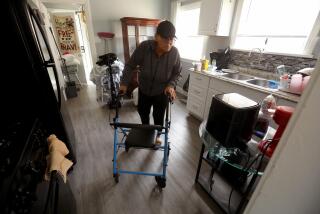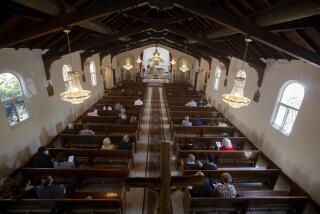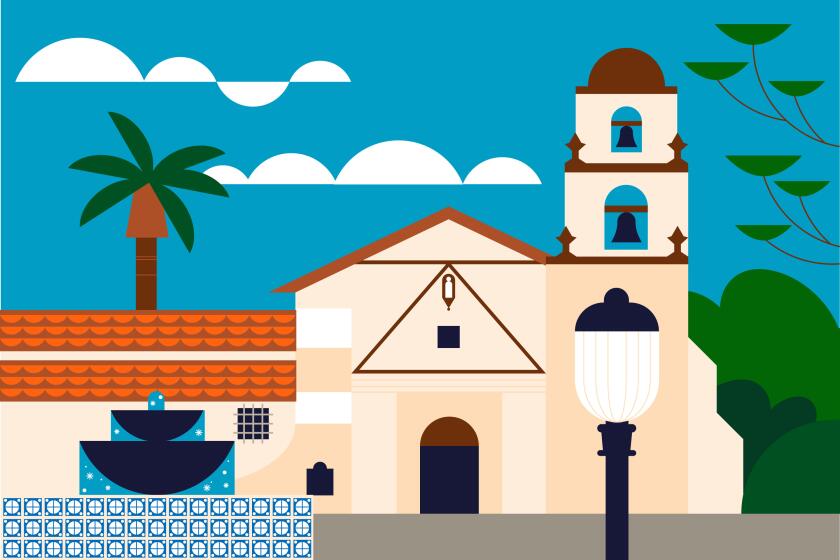Compassion creates a family
Sister Margaret Farrell peers uncertainly over her shoulder as she tries to maneuver a lumbering minivan across several lanes of morning traffic on the Hollywood Freeway.
“I used to drive a cute little nun’s car,” she says, shaking her head.
Her 23-year-old passenger, Leane, chuckles and leans out the window to guide her.
They make a cheerful pair: the Irish nun and the transgender woman.
Audio slideshow: An unlikely friendship
Leane was kicked out of home at 13 and spent years cycling between group homes and the streets. Three years ago, she was diagnosed with late-stage Hodgkin’s lymphoma.
Her mother, she says, would have nothing to do with her. So Sister Margaret became the family she wished she had, ferrying her to hospital appointments and supporting her through months of grueling treatment.
Both say the unlikely friendship has been a source of strength and inspiration. Now Leane is worried about some lumps on her neck. They are headed from a Hollywood homeless shelter to the City of Hope in Duarte to find out if the cancer is back.
Sister Margaret, 51, grew up on a farm in southwest Ireland. County Cork is known as the “rebel county” for its history of resistance to English Protestant rule. But her Catholic parents insisted that their children be respectful of their Protestant neighbors.
“Whatever they were or weren’t, it was none of our business,” she said.
At 22, she joined the Religious Sisters of Charity, an order founded in Dublin in 1815.
“I’m not a holy, pious person, but I was always involved in social justice,” she said. “I guess that’s what my big thing was, to see where I could fulfill this need, this urge I had inside me to do something for the poor.”
In 1998, the order sent her to California, where she lives in a Culver City apartment block with four other nuns.
Through her work with juvenile offenders, she learned about Covenant House California, which operates a shelter and transitional housing for homeless teenagers and young adults in Hollywood. The nonprofit, part of an international network of shelters founded by a Franciscan priest in 1969, was looking for someone to tend to the spiritual needs of the residents, who come from all faiths.
“Ten years later, I’m still there,” Sister Margaret said.
The first time Sister Margaret attended Mass at Church of the Blessed Sacrament in her adopted Hollywood parish, a mother told the congregation how she had come to accept her two gay sons.
“It was surprising to see it done so openly,” Sister Margaret said. “It was great.”
She was soon reminded that such acceptance is not universal. Gay and transgender youth make up a disproportionate share of Covenant House residents. Many of them tell her they were kicked out of religious homes where they were taught that homosexuality is a sin and that they are going to hell.
Sister Margaret’s tiny, cluttered office has become their sanctuary. There, amid piles of donated clothes and toiletries, they know they will find a bracing cup of tea and a sympathetic ear.
“I always tell them Jesus said ‘Do not judge and you shall not be judged,’ so I’m not going to judge anybody,” she said.
Leane was born with a boy’s body. But by age 5, she knew that she wanted to be a girl.
“I put on some high heels and I just loved how it made me feel,” she said, a dreamy look on her face. “Not the baggy clothes that I was forced to wear.”
She says her parents would punish her when they caught her in her mother’s shoes and makeup. When her mother remarried, her stepfather asked if she was gay. Leane said no.
“I liked boys and I wanted to be a woman, so I was straight,” she said.
She spoke about her life on condition she be identified only as Leane. The Times was able to confirm parts of her account from public records and other sources. Attempts to reach her mother were unsuccessful. Other family members declined to be interviewed.
Leane said she ran away frequently from her home in Lancaster, but authorities would find her and send her back, to endure another “whupping.” At 13, she was arrested for truancy and sent to juvenile hall. Her mother, she said, refused to take her back.
“She just gave me up like I was trash.... I told her I want to be a woman and she said you are not going to be a woman in this house.”
She was sent to a group home for gay and lesbian adolescents, but she chafed at the rules and continued to run away.
By 15, she was selling her body in Hollywood to pay for hotel rooms because she didn’t want to sleep on the streets.
It was dangerous work. Leane said she was held up at gunpoint, raped, robbed. One client stabbed her in the chest and left her bleeding on the sidewalk. She was 16.
But she found acceptance among the transgender prostitutes who work Santa Monica Boulevard and other parts of Hollywood. The money was fast and intoxicating. She could afford to dress the way she had always wanted.
“You name it, I bought it: shoes, purses, hair, makeup,” she said. “Every night was a fashion show.”
Her favorite look featured a wig of long brown hair with bangs, which she combined with tight jeans and glittery eye-shadow. She got high on crystal meth and learned where to go for black market hormones. The estrogen injections made her face smoother, her chest fuller, her hips curvier.
“I thought, ‘This is finally who you’re meant to be,’” she said.
She did not suspect she was ill until a lump appeared on her neck. Doctors at Los Angeles County-USC Medical Center delivered the news: Without treatment, she had about six months to live.
After surgery and a year of chemotherapy covered by Medi-Cal, she thought she had beaten the lymphoma. Then her back started to hurt. One day, she woke up in a Hollywood hotel room and couldn’t walk. Terrified and alone, she dialed 911.
At first, Leane didn’t know what to make of the diminutive woman who burst into her hospital room and chatted merrily in a thick Irish accent.
She thought nuns dressed in religious habits. But Sister Margaret showed up at Providence Saint Joseph Medical Center in Burbank in jeans and a sweater, her hair in a bob. Hospital staff members had called Covenant House for help: Leane was homeless, and the hospital couldn’t discharge her to the streets.
Leane weighed less than 100 pounds, she could barely walk and her hair was falling out in clumps.
“I couldn’t even look at myself. I was just disgusted,” she said. “And when the drugs and the money are gone, who is there? Nobody.”
Sister Margaret was there. She brought Leane fresh clothes, distracted her with gossip magazines and indulged her cravings for Toaster Strudel.
“She didn’t judge me,” Leane said. “That was how my mom was supposed to be, how she was supposed to treat me. But she never did.”
After another round of surgery and more chemotherapy at County-USC, Leane’s doctors told her there was nothing more they could do. Leane wouldn’t give up. She was referred to City of Hope, where doctors recommended more aggressive chemotherapy and a stem cell transplant.
A social worker sat down with Leane and Sister Margaret to prepare them. Leane would need a room of her own to avoid infections and someone to take her to appointments and support her through the pain, nausea and vomiting.
“I was thinking, “Oh, my God … and she lives in a homeless shelter,’” Sister Margaret said.
Together, they prepared Leane’s final directives.
“In my last hour, I asked for someone to please hold my hand,” Leane said. “And if some godly music was available, I would like some godly prayer music to be played.”
Leane was desperate to see her mother. Sister Margaret got ahold of her stepfather by phone and explained the gravity of the situation. He told her Leane’s mother wasn’t interested.
“It was so tragic,” Sister Margaret said. “She’s a human being. It doesn’t matter what she is or isn’t. That’s why I took her on as my project.”
Leane has shelves full of wigs, makeup and fancy shoes. But since the stem cell transplant in December, she rarely bothers with them. They are relics of a life she is determined to put behind her. These days she’d rather be in sweat pants and sneakers, with perhaps a pair of stud earrings to add a little sparkle.
“I have learned to be comfortable in my own skin,” she says. “I know that I’m a woman in my heart and in my mind. So it doesn’t really matter how I dress.”
Leane returns to City of Hope regularly for tests and has been hospitalized several times with infections and other complications.
When she doesn’t have medical appointments, she likes to accompany Sister Margaret on her rounds to collect donations for Covenant House and go with her to church on Sundays. She recently moved from Covenant House into an apartment subsidized by the shelter and is planning to study for the high school equivalency exam. She thinks she might become a nurse.
“I’d like to help other people who are sick,” she says. “Because I know how much it means to me and how it makes me feel to know that you have someone taking care of you.”
In the van, Leane’s face brightens as they pull into City of Hope. She feels at home here, she says. Sister Margaret points out the flower beds, which are bursting with color.
“Remember, we sat in the gardens sometimes,” she says.
“And read our gossip magazines,” Leane adds.
Inside, her oncologist, Dr. Joseph Alvarnas, checks the lumps on her neck.
“These feel like salivary glands to me. These don’t feel like lymph nodes,” he tells her. Together, they go over her latest scans.
“We don’t see any big tumor masses that we would worry about,” Alvarnas says. “I’m very happy.”
Leane and Sister Margaret exchange high fives.
“We did a great job, girl,” Leane says.
“Yes, girl!” Sister Margaret replies.
Audio slideshow: An unlikely friendship
More to Read
Sign up for The Wild
We’ll help you find the best places to hike, bike and run, as well as the perfect silent spots for meditation and yoga.
You may occasionally receive promotional content from the Los Angeles Times.










